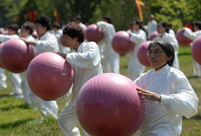 Amphibious armored vehicle unit conducts open sea drill
Amphibious armored vehicle unit conducts open sea drill
 Water relay in Henan
Water relay in Henan
 Ethnic culture feasts eyes of travelers
Ethnic culture feasts eyes of travelers
 80 security dogs assembled in Nanjing police dog training base
80 security dogs assembled in Nanjing police dog training base
 Graffiti artists paint on street walls in Xinjiang
Graffiti artists paint on street walls in Xinjiang
 Story of ceramic artist Zhang Lingyun
Story of ceramic artist Zhang Lingyun
 Magic summer night dream in Hongyuan
Magic summer night dream in Hongyuan
 Incredible creatures in headwaters drainage region of Lancang River
Incredible creatures in headwaters drainage region of Lancang River
 The future of rock n' roll seen in young rockers in China
The future of rock n' roll seen in young rockers in China
 Magnificent Yanziya Cliff
Magnificent Yanziya Cliff
The Chinese government is currently conducting anti-monopoly investigations into several transnational corporations like Audi, Chrysler, Benz, Microsoft, and Qualcomm. As is the case with anti-corruption, anti-monopoly needs to catch "tigers" as well as "flies". Fearing they may lose their privileges, some transnational corporations think this round of investigation "too strict". The current round of investigations shows that anti-monopoly will become the norm in China, and foreign corporations will need to adapt accordingly.
This round of investigation covers foods, medicine, telecommunication, internet and automobiles, all of which are closely related to the daily life of ordinary people. While some say the investigation aims to force foreign companies to reduce their prices, its true intent is to promote fair competition.
What is anti-monopoly? People tend to regard banks, Chinese petroleum companies and telecommunications as typical monopolized industries in China. However, this round of investigations targets transnational corporations. Some claim that law enforcement departments are deliberately targetting foreign companies. But developed countries also implement anti-monopoly policy to prevent big companies from abusing a dominant position in the market and allow emerging enterprises to enjoy equal development opportunities. Internationally, anti-monopoly laws usually consist of agreements prohibiting monopoly, prohibition of abusing dominant market status, and regulations on the concentration of business operators. In principle, China's anti-monopoly laws are in accord with those in U.S. and Europe. The laws target companies that abuse their status in the markets.
Anti-monopoly regulates competition. At present, China's national enterprises are not familiar with these rules. However, transnational corporations are experienced in fighting organizations conducting anti-monopoly investigations. Therefore, they are more cunning than Chinese corporations. For instance, in the case of the price fixing between Mao Tai and Wu Liangye, two prestigious white spirits in China, these two corporations unveiled their discussions to the public. Transnational corporations keep their negotiations informal, leaving no evidence. Such conduct is a target of this round of investigations.
China currently has Memorandums of Cooperation with the U.S., the European Union, South Korea and other countries, in order to better cooperate in the area of anti-monopoly. Numerous transnational corporations listed by Chinese government have also been investigated by other countries for monopoly. Microsoft was fined in the U.S. and Europe, and Qualcomm was subject to anti-monopoly investigations in Europe and South Korea.
The article is edited and translated from《反壟斷打“洋老虎”并非選擇執(zhí)法》, source: Beijing Times, author: Xie Guanbin
 Beijing policewomen posters become a hit
Beijing policewomen posters become a hit Armored regiment trains on the sea
Armored regiment trains on the sea Children spend 'Father's Day' with dads at work
Children spend 'Father's Day' with dads at work 'Pan Da' appear in Shanghai World Financial Center
'Pan Da' appear in Shanghai World Financial Center Champions take selfies on podium
Champions take selfies on podium National Fitness Day celebrated around China
National Fitness Day celebrated around China Traditional culture colors summer vacation
Traditional culture colors summer vacation Young athletes fighting for their dreams
Young athletes fighting for their dreams 68 meters high thermometer in Shanxi, called ‘fighter’ of thermometers
68 meters high thermometer in Shanxi, called ‘fighter’ of thermometers The vanishing folk skills
The vanishing folk skills Intoxicating beauty of Dali, Yunnan province
Intoxicating beauty of Dali, Yunnan province Memorable moments of Ludian earthquake
Memorable moments of Ludian earthquake Bring world together to help elephant
Bring world together to help elephant 'Building Dreams'
'Building Dreams'  Labrang Monastery
Labrang MonasteryDay|Week|Month